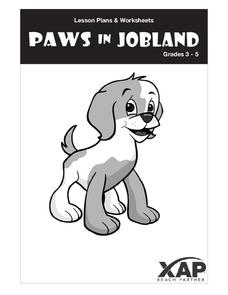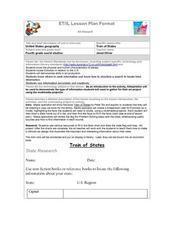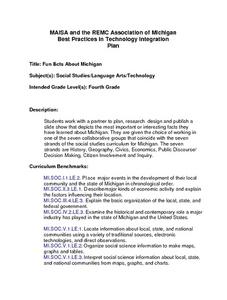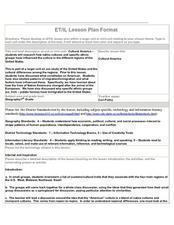Curated OER
Paws in Jobland
Students explore jobs in different countries . In this lesson about different countries through research. Students are broken into groups and given a country to research. Each group is provided with a worksheet with 14 questions to be...
Curated OER
Equator, North Pole, and South Pole
Students identify the Equator, North Pole, and South Pole on the globe. In this map skills lesson, students use a globe marker to locate specific locations on the globe. Students find where they live in relation to the Equator.
Curated OER
Train Of States
Fourth graders create a class book with information about each of the United States. After students draw a state name out of a hat, they use various resources to fill in a facts chart about their state. Students draw the state flag and...
Curated OER
Sing a Song of Coinage
Students examine the Tennessee state quarter. They discuss Tennessee's musical heritage, examine all of the coins and as a group, create a song about coins or money. They also complete worksheets pertaining to the lesson.
Curated OER
Lost Creek- Sacred Landscapes
Eighth graders engage in the discovery of the meaning of Sacred Landscapes. The religious concept is researched for its impact upon the practices of Native Americans and the geographical regions. They write reflection papers upon the...
Curated OER
A Changing Society
Seventh graders examine Chaucer's work about the medieval times. In groups, 7th graders imagine what modern activities could replace some tasks used in medieval times.
Curated OER
'My Town' Brochure
Ninth graders use the internet to research a city or town on the "Walk Across Texas" route. They create a brochure or booklet advertising their assigned city or town.
Curated OER
the Potential Consequences of Climate Variability And Change
Young scholars analyze the consequences of changing variables on a system. Changes in a model are measured and recorded and conclusions drawn based on the data provided in this six lessons unit.
Curated OER
Learning from Primary Source Documents One Day at a Time
Students differentiate between primary and secondary research sources before making a visual representation of their research into the colonist of Fort St. Louis. They write inquiry questions to guide their research.
Curated OER
Michigan Fun Facts
Fourth graders work with a partner to plan, rese,a rch design and publish a
slide show that depicts the most important or interesting facts they
have learned about Michigan. They are given the choice of working in
one of the seven...
Curated OER
Trade in the Global Village
Students use the internet to research the trade status and needs of a country of their choice. Using this information, they determine which three main products their nation needs to import and which ones they can export. They write a...
Curated OER
War of 1812
Eighth graders examine how Andrew Jackson's decisions during The Battle of New Orleans led to victory. They study the importance of The Battle of New Orleans in the Treaty of Ghent and discuss the results of the War of 1812. Finally,...
Curated OER
State Report
Students create a state report/ presentation. They research U.S. state information using the Internet and retrieve information about specific topics (Individual States in the USA) using technology resources.
Curated OER
Yam and Eggs
Students gain knowledge about the different kinds of foods people eat around the world for breakfast. They look at a map and see if they can come up with reasonable answers as to why location may affect what people eat. Students also...
Curated OER
At Your Fingertips
First graders observe a variety of different foods including kiwi, banbnas, coffee, chocolate and discuss where they come from. They discuss the terms import and export then identify the locations where the items came from and their...
Curated OER
Cultural America
Seventh graders investigate the cultural differences that can be found in America. They discuss what it means to be called an American. The patterns of migration to America are discussed with the use of maps and geographical terms....
Curated OER
The People Behind the Numbers
Tenth graders brainstorm potential definitions for "developed" and "developing" countries. They work in groups of four and research using Web sites listed to find information about their country then they create a spreadsheet which...
Curated OER
Water: On the Surface and in the Ground
Students explore the differences between surface water and ground water. They collect data using maps and graphs and investigate a Texas river basin and a nearby aquifer. They complete a written report including maps and data regarding...
Curated OER
Water-Is There Going to be Enough?
Students research the availability, usage and demand for water in the local area historically and use projections of the availability, usage and demand for water up to the year 2050. They gather data and present the information in...
Curated OER
The Path of Pollution
Students conduct a brainstorming exercise that asks them to list all the ideas about air pollution that can be recalled. The ideas are recorded on a chart that the teacher has prepared. The lesson contains sufficient background...
Curated OER
Wickets & Woozles Exile Simulation
Students divide into two groups and become Wickets and Woozles. They are separated in the classroom and then participate in a simulation activity in which one group is in "exile." They follow the activity with a class discussion and...
Curated OER
Effects Of Natural Disasters On Environment
Students investigate the concept of how natural disasters effect the environment. They conduct research using a variety of resources. They are given a scenario that needs a defensive speech. Students take a position and defend it by...
Curated OER
Lewis and Clark
Ninth graders study the plants and animals Lewis and Clark discovered on their expedition. There is a plant illustrator, a plant recorder, an animal illustrator, and an animal recorder. They research the plants and animals and the ...



